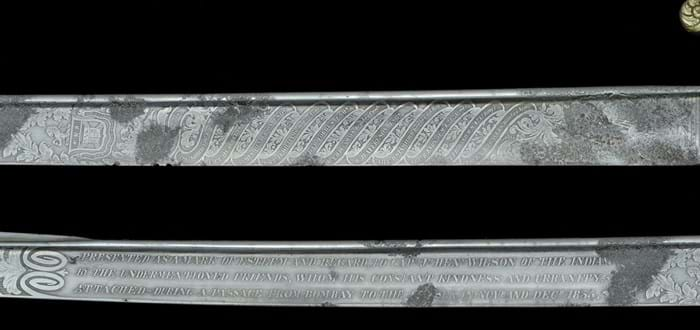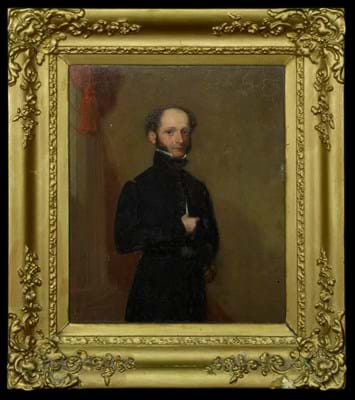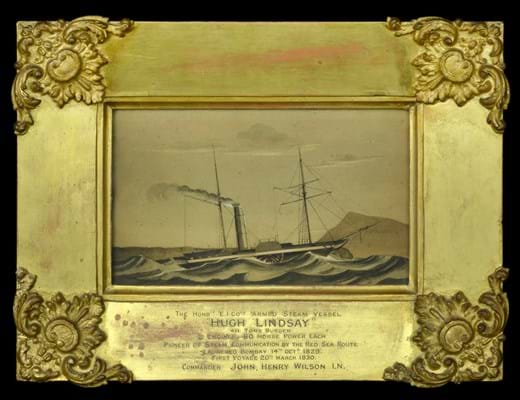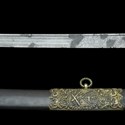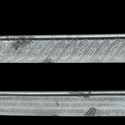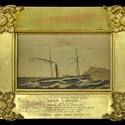On December 8, Dix Noonan Webb will offer a fascinating group of items relating to the early history of the Honourable East India Company’s Steam Navy and, more specifically, the celebrated paddle sloop Hugh Lindsay.
Her master, Commander John Henry Wilson, was one of the foremost pioneers of steam navigation east of Suez.
The sword is inscribed to him with the names of his grateful passengers after Wilson saved them when the steamer ran aground in waters infested with murderous pirates.
The Hugh Lindsay was the first steamship built at Bombay and was launched by Mrs Wilson (presumably the new master’s wife) on October 14, 1829. When she left Bombay on March 20, 1830, bound for Suez on her maiden voyage, carrying a single passenger and 306 pieces of private mail, her decks were almost awash and her paddles could barely turn, being so low in the water.
Designed with bunker space for only five-and-a-half days’ consumption of coal, Wilson had actually been obliged to load enough coal for 11 days, sufficient to get the ship the 1,641 miles to the first coaling station at Aden. He had calculated well, however, and when the Hugh Lindsay arrived off Aden on March 31, having completed the first leg of the voyage solely under steam, only six hours of consumption of coal remained in the stokehold.
After re-coaling, the ship headed for Mocha to land official despatches and arrived at Suez on April 22, the complete voyage of 3000 miles having taken 22 days and 16 hours including stoppages.
From Suez, the mail Wilson had brought went straight overland to Alexandria and then by packet steamer to London. The whole ‘experiment’ – as it was referred to at the time – to test the feasibility of a steam service to convey the London mails had proved a triumph and Wilson returned to Bombay to receive a hero’s welcome and the thanks of the Bombay government.
The service continued successfully for the next few years, with the Hugh Lindsay plying a regular scheduled route from Bombay to Suez through the Red Sea at a time when that area was infested with pirates.
Any passengers were well aware of the risks, and so when she stranded on an uncharted sandbank in the Red Sea, bound for Suez, on December 8, 1835, they knew what peril they were in.
Luckily for them, Commander Wilson assessed what needed to be done quickly and managed to re-float the ship before it came under attack, almost certainly saving the lives of those on board in the process. Those grateful passengers – predominantly officers of the HEIC but also several civilians - presented him with this elaborately decorated and inscribed sword in deepest thanks.
Wounded in brave attack
The consignment to DNW also includes an oil portrait of Wilson, who first came to official notice as a young lieutenant on the Benares when he participated in the Bombay Marine’s assault on Mocha (on the Red Sea coast of Arabia, just north of Aden) where, when the enemy garrison capitulated on December 30, 1820, he (and a seaman) was 'seriously burned' by an exploding mine after already distinguishing himself during the initial landings.
By December 1829 – and now promoted to commander – Wilson was overseeing the fitting out of the new steam sloop Hugh Lindsay, recently completed in the Bombay yard of Nowrojee Jamsetjee, the so-called ‘master builder’ of Bombay.
Wilson’s six-year tenure as master of the vessel was to make him one of the most celebrated mariners of the eastern seas and he was undoubtedly one of the foremost pioneers of steam navigation east of Suez.
After relinquishing his sea command, he was appointed Comptroller of Bombay Dockyard in February 1836, a position he held until May 1838 when he retired from the HEIC’s service. He died in December 1875, largely forgotten and, to history’s shame, having never received any official recognition of his achievements.
He did have this sword, though, which is now estimated at £3000-4000 in the DNW sale. The saleroom is also offering Wilson’s 1827 pattern Royal Navy service sword (by family repute) for £400-500.



